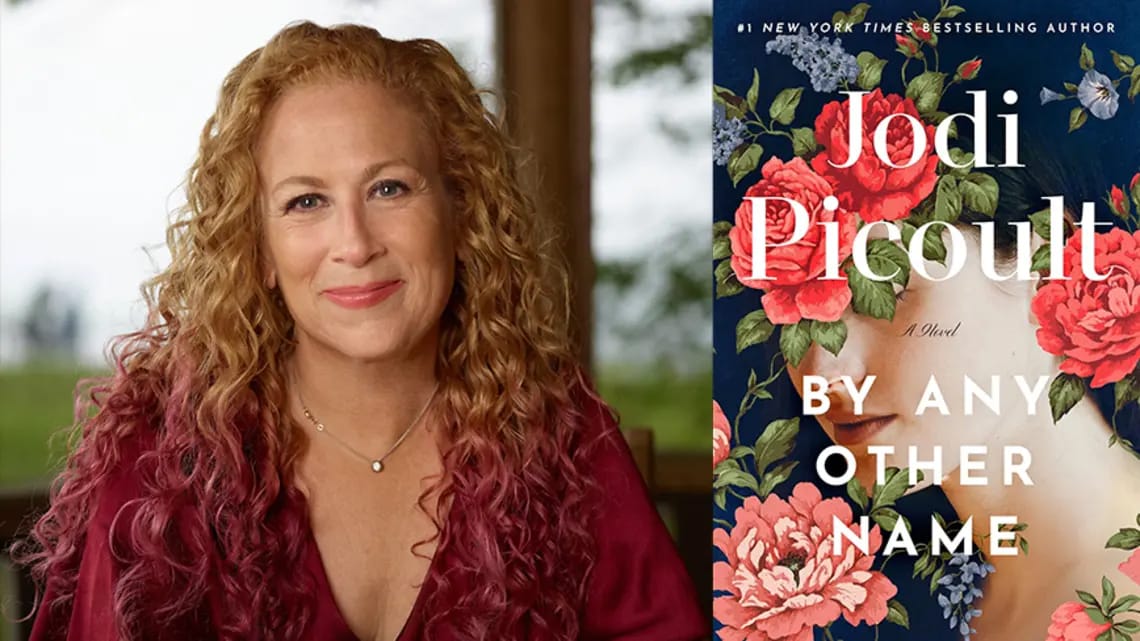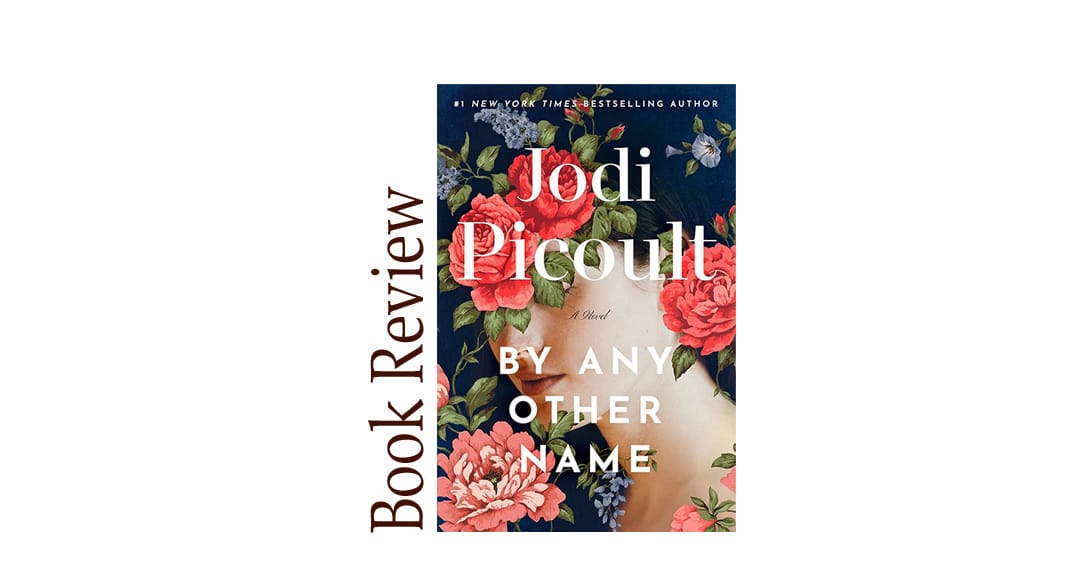- Date Published:
2024 - Length:
544 pages—Listening Time: 18 hr 25 minutes - Genre:
Fiction, Historical Fiction - Setting:
1581 London, England and 2024 New York City - Awards:
Goodreads Choice Awards Nominee Historical Fiction 2024; Lariat Adult Fiction Reading List Selection 2025; LibraryReads Monthly Pick Hall of Fame August 2024; Seminary Co-op Notable Book 2024 - Languages:
English - Sensitive Aspects:
Gender inequality, misogyny, sexual content, violence, abuse, heavy-handed feminist themes, and identity deception - Movie:
There are currently no announced movie deals for Jodi Picoult's novel By Any Other Name. - Recommended for Book Club:
Yes.

I spent years in the theater—summers onstage and directing at community playhouses, college semesters dissecting Chekhov, evenings watching actors transform blank stages into entire worlds. So when By Any Other Name by Jodi Picoult was recommended to me, I was already sold. A novel about Emilia Bassano, the woman who might've written Shakespeare's plays? Sign me up. The premise practically hummed with everything I love: historical intrigue, literary controversy, and the kind of what-if questions that keep you up at night. Did I love it? Not quite. But did it get under my skin in ways that mattered? Absolutely.
Picoult weaves two timelines together—Emilia's story in Elizabethan England, where she secretly writes plays under Shakespeare's name because women weren't allowed in theater, and Melina Green's contemporary struggle as a playwright in modern New York. The historical sections? Gorgeous. Rich, immersive, heartbreaking. Emilia's voice leaps off the page with all the brilliance and frustration of a woman who knows she's capable of greatness but is forced to hide behind someone else's name. I could feel the weight of that erasure, the bitter triumph of creating something beautiful that would never truly be yours.
But here's where I stumbled: Melina's contemporary storyline felt... off. Maybe it's because I've lived in the theater world and know its particular brand of sexism intimately, but her character arc strained credibility for me. The premise—that she'd let her best friend Andre pretend to be the playwright while she hid in the wings—felt like a plot device rather than an authentic choice. Would a talented, driven playwright really go along with that charade for so long? Perhaps. But the way it unfolded didn't quite ring true.
Still, what Picoult gets devastatingly right is the gender inequality that has plagued theater for centuries—and continues today. Even now, male playwrights outnumber women roughly three to one at the highest contract levels, and plays by women receive fewer resources and smaller budgets. The numbers are damning: men have written thousands more roles simply because their work gets produced at triple the rate. It's not just about historical injustice—it's ongoing, systemic, and infuriating. Women have been shut out of telling stories on stage since the beginning, and we're still fighting for space at the table.
Picoult shines brightest when she lets the past and present collide head-on, reminding us that in the theater, history is always writing its next act… and sometimes, it’s worth peering behind the velvet curtain to see who’s really holding the pen.

What if the words we celebrate most weren't written by the people we think? That's the question at the heart of Jodi Picoult's By Any Other Name, a dual-timeline novel that braids together two women's desperate fight to be heard in worlds that would rather they stay silent.
In present-day New York City, Melina Green is a playwright carrying old wounds and fresh disappointments. After a brutal takedown from theater critic Jasper Tolle years earlier—one that demolished her confidence and derailed her career—she's given up on her dreams. But when her best friend Andre discovers her ancestry leads back to Emilia Bassano, a 16th-century poet with tantalizing connections to Shakespeare, Melina finds her voice again. She writes a play exploring the controversial theory that Emilia might have penned the Bard's most famous works. When Andre secretly submits her play to a festival under the gender-neutral name "Mel Green," it gets accepted immediately—by the same man who once destroyed her. Now Melina faces an impossible choice: come clean and risk rejection, or let Andre pose as the playwright while she watches her words belong to someone else.
Meanwhile, we travel back to 1581, where young Emilia Bassano is brilliant, educated, and utterly powerless. Forced to become the mistress of the Lord Chamberlain—the man who controls all theater in England—she witnesses the transformative power of plays but knows women are forbidden from writing them. So she hatches a daring plan: pay an actor named William Shakespeare to present her work as his own. It's survival, ambition, and heartbreak all at once.
As both timelines unfold, Picoult weaves a story about the price women pay for being heard, the lies we tell to protect our dreams, and what it means when your legacy belongs to someone else.

Here are compelling reasons you should pick up By Any Other Name by Jodi Picoult:
It's a Love Letter to Shakespeare (and His Secret Collaborator)
This isn't your high school English class Shakespeare. Picoult weaves a dual timeline that imagines Emilia Bassano—a real Renaissance woman who might've penned some of the Bard's greatest works—alongside a modern playwright fighting for credit. If you've ever wondered who really wrote those sonnets, this book will have you questioning everything you thought you knew.
The Feminist Angle Hits Different
Emilia's story is every woman who's been talked over in a meeting, every artist whose work was stolen by a man with more power. But Picoult doesn't make her a victim—she makes her fierce, brilliant, and maddeningly human. You'll want to reach back through time and give her a high-five (or a good lawyer).
The Dual Timeline Actually Works
We've all read books where the historical sections feel like homework between the good parts. Not here. Picoult ping-pongs between the 1580s and modern-day New York so seamlessly you'll resent having to put the book down to eat. Both storylines are equally gripping, and when they finally converge? Chef's kiss.
It Makes You Rethink Artistic Credit and Legacy
Who gets to tell stories? Who gets remembered? This book will have you side-eyeing every "great man of history" exhibit at the museum. It's about power, erasure, and the women who created beauty even when they knew they'd never be recognized or thanked for it.
The Writing Is Vintage Picoult
If you've loved Picoult's other work, you know what's coming: gorgeous prose, characters you'll dream about, and moral complexity that refuses easy answers. She's at the top of her game here, blending historical research with emotional gut-punches.
It's Perfect for Book Club Discussions
The themes practically beg for debate: authorship controversies, gender inequity in the arts, historical fiction versus historical fact. Plus, there's enough Shakespeare references to make everyone feel smart without requiring a degree in English Lit.
You'll Learn History Without Realizing It
Picoult did her homework on Elizabethan England—the politics, the plague, the constraints on women. But she never lectures. Instead, you're so caught up in Emilia's world that you absorb the history by osmosis. It's like getting a graduate seminar disguised as entertainment.
The Romance Isn't What You Expect
There's love here, but it's complicated, messy, and sometimes heartbreaking in ways that feel true to life. No tidy happily-ever-afters or instalove nonsense—just real people making impossible choices in circumstances that would break most of us.
It Celebrates Women Supporting Women
In both timelines, female friendships and mentorships drive the story forward. These aren't women competing for scraps of male attention—they're building networks, sharing knowledge, and fighting for each other's success. It's refreshing and necessary.
The Ending Will Stay With You
No spoilers, but Picoult sticks the landing in a way that feels both surprising and inevitable. You'll close the book feeling like you've been on a journey that mattered—and you'll immediately want to discuss it with someone who gets it.


Purchase Jodi Picoult Books
Jodi Picoult masterfully weaves emotionally charged narratives that tackle today's most controversial moral dilemmas, compelling readers to question their own beliefs while turning pages late into the night.
Bookshop.org was created as a socially conscious alternative to Amazon, with the goal of helping local, independent bookstores thrive. This is why Readers With Wrinkles supports their efforts. Please join us in this effort by purchasing your next read here.

By Any Other Name explores women's struggle for creative recognition. Readers With Wrinkles fans who appreciate thoughtful examinations of female autonomy, literary history, and the invisibility of women's work will find these similar titles equally compelling.
- Hamnet by Maggie O'Farrell
Tells the story of Agnes (Shakespeare's wife) and the death of their son, giving voice to a woman often relegated to the margins of history. O'Farrell reimagines Agnes as a healer with profound emotional depth, exploring maternal grief and the complexities of marriage to a creative genius whose work ultimately immortalizes their loss. - The Silence of the Girls by Pat Barker
Retells Homer's Iliad from the perspective of Briseis, a queen captured and enslaved during the Trojan War. This powerful reimagining examines how women survive in patriarchal systems, giving voice to those who were objects in the original epic. - Alias Grace by Margaret Atwood
Follows Grace Marks, a real historical figure convicted of murder in 1840s Canada. This psychological exploration questions what we know about women in history and how their stories are told, with Atwood examining class, gender, and the unreliability of historical narratives. - Circe by Madeline Miller
Reimagines the Greek goddess as a fully realized woman who finds her power through exile and transformation. Miller weaves ancient mythology with contemporary feminist sensibilities, creating a character who refuses to be defined by the men around her. - Matrix by Lauren Groff
Follows Marie de France, a real 12th-century poet who becomes an abbess and builds a radical women's community. Groff creates a stunning portrait of female ambition, creativity, and the ways women carve out autonomy within restrictive systems. - The Thirteenth Tale by Diane Setterfield
Alternates between contemporary England and the Gothic past, as a biographer uncovers the dark secrets of a dying novelist. Like Picoult's novel, it explores how stories shape identity and the power of finally telling one's truth. - A Light of Her Own by Carrie Callaghan
Chronicles Judith Leyster, a 17th-century Dutch painter whose work was attributed to male artists for centuries. The novel explores her struggle for recognition in the male-dominated art world and her determination to sign her own masterpieces. - Blood, Water, Paint by Joy McCullough (a novel-in-verse)
Tells the story of Artemisia Gentileschi, the Renaissance painter who survived rape and fought for justice while creating powerful works depicting biblical heroines. The novel weaves Artemisia's story with the tales of Susanna and Judith, examining how women find strength through art and storytelling. - The Lost Apothecary by Sarah Penner
Connects an 18th-century female apothecary who dispenses poisons to women seeking freedom from abusive men with a contemporary woman uncovering this hidden history. The dual timeline reveals how women's acts of rebellion echo across centuries.} - Code Name Verity by Elizabeth Wein
Features two young women during WWII—a pilot and a spy—whose friendship becomes a lifeline during wartime. The novel celebrates female courage and the bonds between women who support each other's ambitions.


Comments